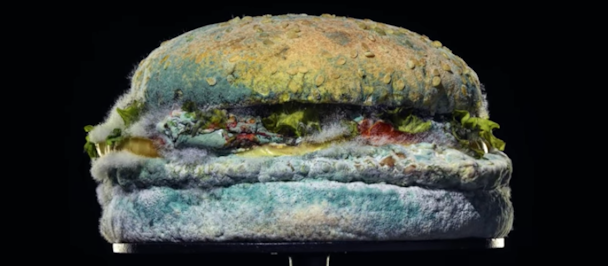The minds behind the Moldy Whopper: ‘The culture of awards doesn’t impact our work’
David Agency is well versed in winning awards. It ranked joint-sixth most-awarded agency worldwide in this year’s World Creative Rankings and second in the US. After a quieter award year thanks to the pandemic, its executive creative directors reflect on why they’ve never seen awards as the goal but a consequence of doing great work.

The culture of awards doesn’t impact our work at David, because we don’t see awards as the goal.
Instead, we see them as the consequence of doing great and relevant work. And that’s the reason why we’ve had some great results recently, being named Agency of the Year in major festivals such as the One Show and D&AD.
For some people in our industry, awards are still the main goal. And that’s the biggest reason why we keep seeing great ideas for clients we’ve never heard of, or ideas that don’t build a brand or have consistency with the rest of the work they do.
But that definitely changed a little bit in 2020. With fewer award shows and agencies being more conscious than ever with their budgets, those kinds of ideas suffered a big hit. And that’s good. Good not only for the advertising industry but also for clients. Because now their agencies can focus their time on having ideas that first will engage real people, and then the juries – not the opposite.
Our mindset is to do original and bold work, and we always push ourselves to do ideas that impact both business and culture. We think that’s what everyone should aim for. To be honest, it’s very hard to do, but it’s not impossible. And we have some examples to prove it.
For an idea like the ’Moldy Whopper’, the goal was to make a bold statement regarding Burger King’s commitment to using real food and the removal of everything artificial from their signature sandwich, from colors and flavors to preservatives. This isn't a new priority for the brand – it’s something Burger King had been working towards for more than four years.
So we ultimately came up with an idea that broke all the rules of conventional advertising, yet generated a ton of buzz around it.
The focus was never how many awards it would win, but instead about having real people sharing and talking about it. And it actually changed perceptions regarding its food.
We didn’t only get billions of impressions, we ended up increasing sales by 14% and the high-quality ingredient perception by 26%. And, most importantly, the brand removed over 8,500 tons of artificial ingredients. These are the results that matter more than any award an idea can win.
Another example for Burger King, this time in Brazil, is the ’Lockdown Whopper’. Brazil was having a hard time getting people to stay home at the beginning of the pandemic, and the president wasn’t necessarily leading by example.
So Burger King decided to gamify the lockdown. By using the geolocation feature in the BK app, the brand allowed users to earn meal rewards for staying home, receiving better deals the longer they stayed in.
In the end, the campaign managed to keep 238,000 people at home, possibly preventing thousands of infections. Not only that, the idea increased downloads of the BK app by 840%, generating a lot of new business for the brand and showing how an idea can be relevant for both society and the brand at the same time.
Last, but not least, there’s ‘Bigger Picture’ for Budweiser. After 37 straight years of running a Super Bowl ad, Bud decided to step out of the Super Bowl and use the media dollars to instead promote vaccine awareness.
The campaign ended up generating over 32 billion impressions and over $170 million in earned media. It became the most successful Super Bowl campaign in Budweiser history, without even running in the Super Bowl. This just shows us, again, that when we talk to people and create ideas that impact real lives, the results can be bigger than any other campaign.
Will these ideas win awards? We don’t know yet. But again, this was never the goal.
This is not a criticism of awards by any means. It’s just a reflection on our industry and our goals as advertising people. We do think that awards are extremely important to push the level of creativity in our industry and drive new business for our agencies, and we’ll keep submitting our work to many of them.
But our priority is to do good work before anything else. We always prefer the idea of being a part of popular culture over winning gold for an idea people will soon forget.
Fernando Pellizzaro and Jean Zamprogno are executive creative directors at David Miami.
The Drum is celebrating this year’s standout performers, and their work, in a special series of editorial features collected on our World Creative Rankings hub. And if you would like to get your hands on the entire World Creative Rankings dataset, you can order our full PDF report.
